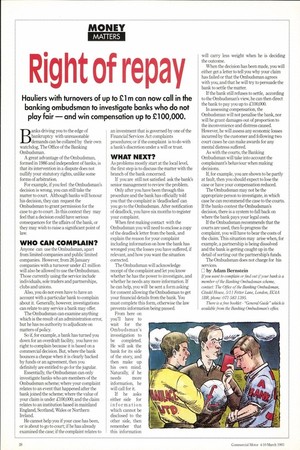will carry less weight when he is deciding the outcome.
Page 30

If you've noticed an error in this article please click here to report it so we can fix it.
When the decision has been made, you will either get a letter to tell you why your claim has failed or that the Ombudsman agrees with you, and that he will try to persuade the bank to settle the matter.
If the bank still refuses to settle, according to the Ombudsman's view, he can then direct the bank to pay you up to £100,000.
In assessing compensation, the Ombudsman will not penalise the bank, nor will he grant damages out of proportion to the inconvenience and distress caused. However, he will assess any economic losses incurred by the customer and following two court cases he can make awards for any mental distress suffered.
As with the courts, the Banking Ombudsman will take into account the complainant's behaviour when making decisions.
If, for example, you are shown to be partly at fault, then you should expect to lose the case or have your compensation reduced.
The Ombudsman may not be the appropriate person to investigate, in which case he can recommend the case to the courts. If the banks contest the Ombudsman's decision, there is a system to fall back on where the bank pays your legal costs.
If the Ombudsman recommends that the courts are used, then to progress the complaint, you will have to bear the costs of the claim. This situation may arise when, for example, a partnership is being dissolved and the bank is getting caught up in the detail of sorting out the partnership's funds.
The Ombudsman does not charge for his services.
1:1 by Adam Bernstein If you want to complain or find out if your bank is a member of the Banking Ombudsman scheme, contact: The Office of the Banking Ombudsman, Citadel House, 5/11 Fetter Lane, London, EC4A 1BR, phone: 071 583 1395.
There is a free booklet' "General Guide" which is available from the Banking Ombudsman's office
















































































